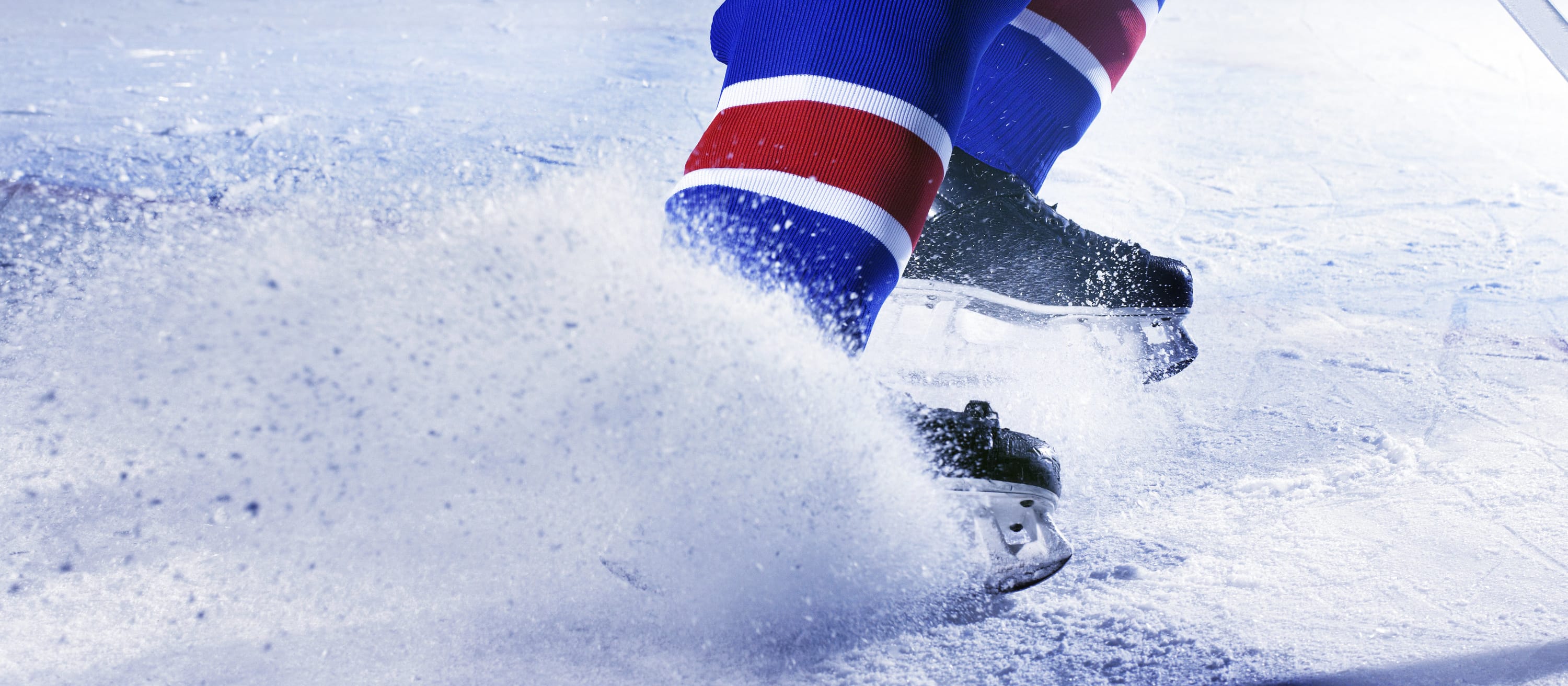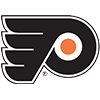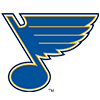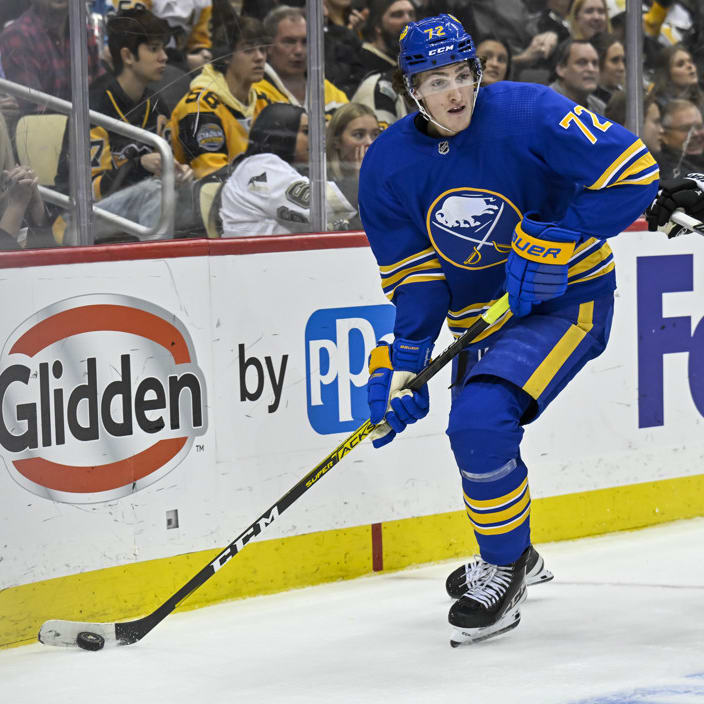On the strength of the inaugural NHL Stadium Series, the return of the NHL Winter Classic, and the second season of Wednesday Night Rivalry, the 2013-14 NHL regular season set a full-season viewership record for NBCSN. While this may seem like great news for the NHL -- and it's certainly not bad news -- put into context, the NHL continues to be thoroughly one-upped for oh-so-important TV ratings by its main head-to-head competitor, the NBA. One of the main culprits the NHL appears to have identified is a continuing decline in the number of goals per game, which has nearly reached its lowest point since the 2003-04 season.
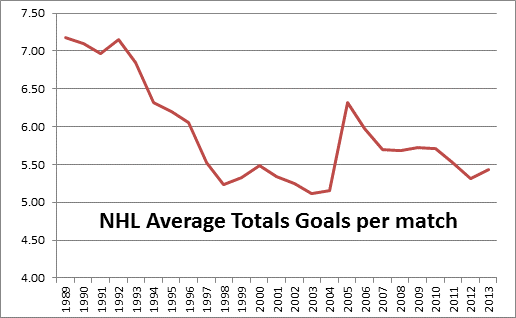
While defense may win championships, nothing entertains the casual fan more than scoring.1 This offseason, the NHL's Board of Governors and the Players' Association approved a number of rule changes that will take effect for the 2014-15 season. While most of the changes are only tiny tweaks to current rules, the league hopes that the slight alterations will lead to more offense and, not coincidentally, more eyeballs to television sets.
1Both the NFL and NBA have fully grasped this concept and for years have been implementing more rules – or making those rules currently on the books a "point of emphasis" – that benefit the offense, to the detriment of the defense, in an effort to increase scoring and make games more appealing to the casual fan.
Most of the new rule changes will have very little impact on
On the strength of the inaugural NHL Stadium Series, the return of the NHL Winter Classic, and the second season of Wednesday Night Rivalry, the 2013-14 NHL regular season set a full-season viewership record for NBCSN. While this may seem like great news for the NHL -- and it's certainly not bad news -- put into context, the NHL continues to be thoroughly one-upped for oh-so-important TV ratings by its main head-to-head competitor, the NBA. One of the main culprits the NHL appears to have identified is a continuing decline in the number of goals per game, which has nearly reached its lowest point since the 2003-04 season.

While defense may win championships, nothing entertains the casual fan more than scoring.1 This offseason, the NHL's Board of Governors and the Players' Association approved a number of rule changes that will take effect for the 2014-15 season. While most of the changes are only tiny tweaks to current rules, the league hopes that the slight alterations will lead to more offense and, not coincidentally, more eyeballs to television sets.
1Both the NFL and NBA have fully grasped this concept and for years have been implementing more rules – or making those rules currently on the books a "point of emphasis" – that benefit the offense, to the detriment of the defense, in an effort to increase scoring and make games more appealing to the casual fan.
Most of the new rule changes will have very little impact on fantasy leagues, such as slight changes to overtime rules, punishments governing diving, and how certain game misconducts will be counted towards a possible one-game suspension.2 A couple, however, are certainly worth noting for savvy fantasy owners looking for every possible advantage. For example, Rule 76 of the Official NHL Rulebook has been modified to curb delay tactics on face-offs after icing infractions. Prior to the 2005-06 campaign, the icing rule was amended to prohibit line changes by the icing team during the ensuing stoppage, penalizing the team icing the puck by forcing tired players to continue to defend without the benefit of a line change. Teams have countered by having their centers intentionally get tossed from the face-off circle by committing violations.3 Usually, two face-off violations by a center will lead to the center getting tossed from the circle and a winger taking his spot.
2You can see a full list of the rule changes here.
3It may not seem like much, but the extra 30-60 seconds of rest for the defenders while the center stalls at the face-off dot can help exhausted skaters recover enough to clear the puck and make it to the bench for a line change.
To cut down on these stalling tactics, the rule has been tweaked to allow an official to call a two-minute bench minor penalty after a defending player taking the face-off commits a second face-off violation. As a result, there could be a league-wide uptick in penalties, potentially yielding added fantasy value for power-play specialists, such as Corey Perry, who could see additional opportunities. Fantasy owners in leagues that reward penalty minutes could also see a slight boost in this category for centers4, who typically provide lesser value in the way penalty minutes than some of their positional counterparts.
4There's no guarantee, however, that the center will actually be the one to accrue the penalty, as a bench minor penalty would be awarded for such violations – meaning any player from the ice, except the goaltender, could be designated to take his place on the penalty bench and serve the penalty as if it as a minor penalty imposed on him.
The NHL has also amended Rule 57 – the rule related to tripping – to increase scoring opportunities. In previous years, a defensive player could legally stymie an offensive breakaway by contacting an offensive player as long as he hit the puck at the same time. In such a case, no penalty would be called. Only if the defenseman hit the offensive player before the puck would a penalty for tripping be called.
The amended Rule 57 now reads that when an attacking player is on a breakaway, a defending player who dives and touches the puck while also contacting and tripping the attacking player will now be called for a two-minute minor penalty. Previously, this type of play had not been a penalty5, and officials are instructed to call more penalties for tripping. By removing the diving defensive stop, the league has increased the odds of an unobstructed breakaway, potentially giving added fantasy value to speed-merchant forwards like Carl Hagelin. Further, similar to the case with the new face-off penalties, there could also be an increase in penalties, which could provide more opportunities for the aforementioned power-play specialists.
5While this now punishes a defenses for a previously-legal play, to mitigate the added pressure on the defense, a penalty shot will not be awarded in these types of situations. A penalty shot may continue to be awarded, however, where body positioning warrants it, when the defensive player commits what would have been a penalty even under the previous definition of tripping – i.e. when the defensive player contacts the offensive player, before touching the puck, causing him to fall during a breakaway situation.
While the new rule changes aren't likely to have an eye-popping effect on the way the game is played, the NHL's intentions are clear – the more goals the better. As such, it's important for fantasy owners to stay on top of these new trends, as any little advantage can mean the difference between kissing the proverbial Cup or shaving that fantasy playoff beard a few weeks earlier than you may have wanted.


